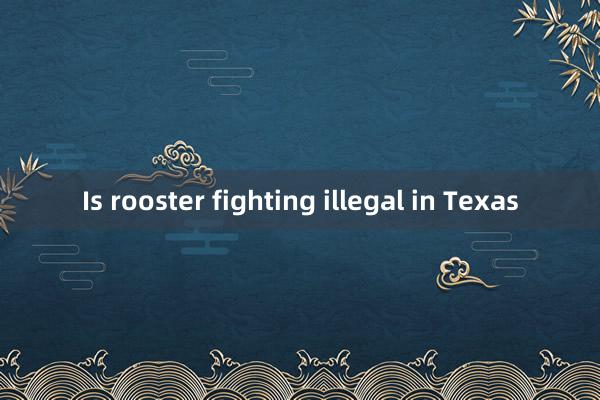Is cockfighting legal in mexico reddit

Is Cockfighting Legal in Mexico?
Cockfighting, or "peleas de gallos," is a tradition that has deep historical roots in Mexico. This activity, which involves roosters fighting each other, has long been associated with Mexican culture, particularly in rural areas. However, the legality and ethics surrounding cockfighting in Mexico are complex and often controversial. This article will explore the legal status of cockfighting in Mexico, its cultural significance, and the growing opposition to the practice.
The Legal Landscape
In Mexico, cockfighting's legality depends on the region. Each of Mexico's 32 states has the authority to regulate or ban cockfighting within its borders. Some states, particularly in the north and rural areas, permit cockfighting and even view it as a culturally significant event. For example, in states like Jalisco and Sinaloa, cockfighting is considered a legitimate sport and a traditional part of local festivals and celebrations. These regions often have specific regulations to ensure that the events are organized in a structured and controlled manner, sometimes even involving gambling.
However, other states, such as Mexico City, have taken a different stance. In 2017, Mexico City passed legislation prohibiting cockfighting within the capital. This decision reflected a growing movement within the country that opposes animal cruelty,tp777.com login aligning with global trends toward stronger animal rights laws. The Mexican federal government has also implemented national animal welfare laws, 55bmw which can sometimes conflict with state regulations. As a result, Betjilivip the legal framework governing cockfighting in Mexico is often inconsistent, PH365 VIP login varying greatly depending on local customs and political attitudes.
Cultural Significance
Cockfighting is not just a pastime in Mexico; for many, jili voucher code it is a cultural heritage passed down through generations. The practice dates back to the Spanish colonial period and possibly even earlier. Over the centuries, it has been woven into the fabric of local celebrations, particularly in rural and agricultural communities where livestock and farming are central to life. In these areas, cockfighting is seen as an expression of machismo, skill, and tradition.
Many cockfighters view their participation as a way of honoring their ancestors and preserving their cultural identity. The roosters themselves are often treated with great care before the fight, with specialized diets and training to ensure they are in peak physical condition. Some see this as a sign of respect for the animals, though opponents argue that this does not justify the violence they endure in the ring.
Ethical and Legal Challenges
đăng ký đăng nhập slot go88The ethics of cockfighting is a topic of intense debate both within Mexico and internationally. Animal rights organizations argue that the practice is inherently cruel and barbaric, as the roosters are often fitted with sharp blades on their legs, leading to severe injuries or death during the fights. These groups have been pushing for a nationwide ban on cockfighting, claiming that it has no place in a modern society that values animal welfare.
On the other hand, supporters argue that cockfighting is a part of Mexico’s cultural heritage and should be preserved. They maintain that the roosters are bred specifically for fighting and that their natural aggression makes the sport less cruel than it may seem to outsiders. Some proponents also point to the economic benefits, as cockfighting can attract tourists and generate income for local economies, particularly in rural areas where employment opportunities may be limited.
Growing Opposition
In recent years, Mexico has seen increasing opposition to cockfighting from various sectors of society. Urbanization, globalization, and the influence of animal rights movements have shifted public opinion, particularly among younger generations and people living in cities. Many Mexicans now view cockfighting as an outdated and inhumane tradition that should be left in the past.
This growing sentiment is reflected in the increasing number of states that have introduced restrictions or outright bans on cockfighting. Some municipalities have taken steps to impose hefty fines on those caught organizing or attending cockfights, while others have sought to educate the public about animal welfare issues. The federal government, under pressure from both domestic and international animal rights groups, may eventually consider implementing a nationwide ban, though such a move would likely face significant resistance from regions where cockfighting remains popular.
Conclusion
The question of whether cockfighting should remain legal in Mexico is a complex one, deeply intertwined with issues of cultural heritage, animal rights, and regional autonomy. While some states continue to embrace the tradition, others are moving toward stricter regulations or outright bans in response to growing concerns over animal cruelty. The debate over cockfighting's future in Mexico is unlikely to be resolved soon, as it involves a delicate balancing act between respecting cultural traditions and adapting to modern ethical standards.
In the coming years, the legal and cultural landscape of cockfighting in Mexico may shift even further, especially as younger generations push for more humane treatment of animals. Until then, the practice remains legal in some parts of the country, but its future is far from certain.
Jili999 casinowww.april-perez.com












